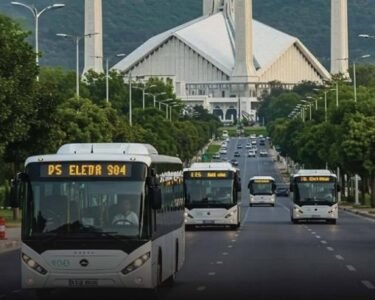The Electric Tram Trial Lahore has officially begun, marking a historic first for South Asia. The Punjab Government, under the leadership of Chief Minister Maryam Nawaz Sharif, has introduced a trackless electric tram system on Canal Road Lahore as part of a major urban transport modernization initiative.
This innovative vehicle, known as the Automated Rail Rapid Transit (ART), is imported from China and is currently being assembled at Ali Town Depot in Lahore. Unlike traditional rail systems, the tram runs on rubber tires, operates without tracks, and is capable of covering 25 to 27 kilometers with just a 10-minute electric charge.
The electric tram features:
- Three interconnected compartments
- Passenger capacity of up to 300 people
- Fast charging capability
- Wi-Fi and CCTV surveillance
- Solar-powered charging stations
Initial Route and Test Plans
The initial test route will likely stretch from Thokar Niaz Baig to Harbanspura along Canal Road, with possible expansion to Gulberg’s Main Boulevard. During these trials, engineers and transport officials will evaluate the tram’s performance in real-time traffic. The government is also committed to ensuring eco-conscious development by avoiding road widening and tree removal.
This electric tram is seen as a cost-effective and environmentally friendly solution to urban mobility challenges. According to CM Maryam Nawaz, it represents the future of sustainable public transport in Punjab.
Part of Punjab’s 5-Year Urban Transport Vision
The electric tram trial is a central feature of Punjab’s five-year plan to revolutionize transportation across major cities. Inspired by ART systems in Abu Dhabi, Malaysia, and Qatar, this initiative could soon expand to cities like Faisalabad, Gujranwala, and others within the 2024–25 fiscal year.
If the Lahore tram pilot proves successful, the system will be scaled up with multiple ART corridors across Punjab, improving connectivity, reducing traffic congestion, and cutting emissions.
Why This Matters?
The Electric Tram Trial Lahore isn’t just a local achievement—it positions Punjab as a regional leader in sustainable, smart urban transport. With zero track costs, lower emissions, and scalable technology, it could redefine public commuting across South Asia.






